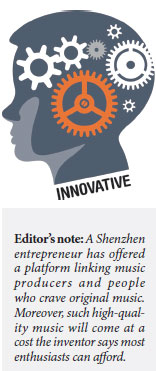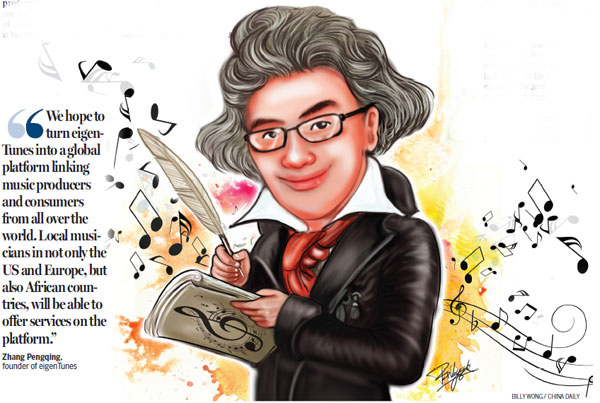Paddling into the ocean of music in new era
Updated: 2016-11-10 10:15
By Zhou Mo in Shenzhen(HK Edition)
|
|||||||||
While most entrepreneurs set their sights on taking advantage of high technology to create new inventions to make people's lives easier, Zhang Pengqing has chosen another path.
The demand for better spiritual enjoyment is growing among Chinese people as their material lives improve, Zhang believes, so he decided to sail into the ocean of music.
"When people's basic needs are met, they move on to the next stage - spiritual life. Music is one of the best forms of expressing emotions and promoting communication," he says.
The Shenzhen entrepreneur has set up eigenTunes - a music platform that connects folk musicians and a growing number of people, enterprises and organizations with the urge for original music.

"Nowadays, the consumption of original music is on the rise," he stresses.
Many people may want to send a special song to their loved ones to express their love, or enterprises and organizations may want to produce a piece of music that's unique and representative of their own culture and spirit.
However, for ordinary people and small enterprises, Zhang says, it's difficult to invite a well-known composer to write a song for them, and music production in a professional studio usually costs thousands or even tens of thousands of yuan, which is beyond their reach.
"There're quite a number of folk musicians who have great talents in composition and music production, including students in art university and music service providers. They are able to meet ordinary consumers' demand with much more affordable prices. What we do is to build a platform to bridge both sides," he says.
"In this way, ordinary people and small enterprises' demand for original music can be satisfied while, at the same time, the value of folk musicians can come into full play."
EigenTunes has gathered some 30 musicians since its establishment half a year ago. The production of a piece of music by its musicians costs between 1,000 and 1,500 yuan ($148 to $221) - much lower than that charged by music studios.
A father on the Chinese mainland recently expressed his deep love for his little daughter by sending a song specifically produced for her. The art work was produced by a US-based student composer on eigenTunes.
"We hope to turn eigenTunes into a global platform linking music producers and consumers from all over the world. Local musicians in not only the US and Europe, but also African countries, will be able to offer services on the platform," Zhang envisages.
Chen Wenyang, deputy secretary-general of the Shenzhen Venture Capital Association, says eigenTunes' creation, by stimulating musicians' enthusiasm for art making and people's demand for music, helps enhance the spiritual quality of the general public.
"With decades of fast economic growth, the economic conditions of the Chinese people have been greatly improved," she says.
"Now, they need to enhance their spiritual quality. EigenTunes, in this sense, can play an active role."
The Chinese music market has seen significant changes in recent years, with a growing number of people willing to pay for high-quality music instead of listening to poor-quality, pirated music.
A survey by ReChord - a market intelligence organization focusing on the music industry - shows that 64 percent of Chinese people spent more than 800 yuan on music last year, while expenditure on music by 20 percent of the population exceeded 5,000 yuan.
A report by market research firm Nielsen shows that more than 977 million Chinese people listen to music every week, accounting for 72 percent of the country's population. It expects music consumption nationwide to hit $56 trillion within the next decade.
However, the lack of copyright protection remains a problem. With interests being undermined, many musicians are no longer passionate about producing music, leading to the reduction in high-quality music content.
Zhang does understand the challenge and is committed to protecting the rights of musicians through his platform.
"The audience can listen to the music and share it with others on social networking platforms. But, they're not allowed to download them freely on eigenTunes," he warns.
He also adopts an innovative business model to maximize the economic gains of the musicians.
"We do not charge commissions from deals made on the platform as we cherish the value produced by musicians and don't want to grab a share from them. Instead, we'll base our profits on the so-called 'fans economy' and cultural products derived from our services like T-shirts."
For example, listeners can offer tips to the musicians whose art works they like, and the platform will charge a certain percentage from it.
"When our visitor base grows to a certain scale, the 'fans economy' will be formed. This will bring us economic benefits. More importantly, it'll encourage musicians to produce more high-quality music, promoting the development of the industry," says Zhang.
sally@chinadailyhk.com

(HK Edition 11/10/2016 page8)